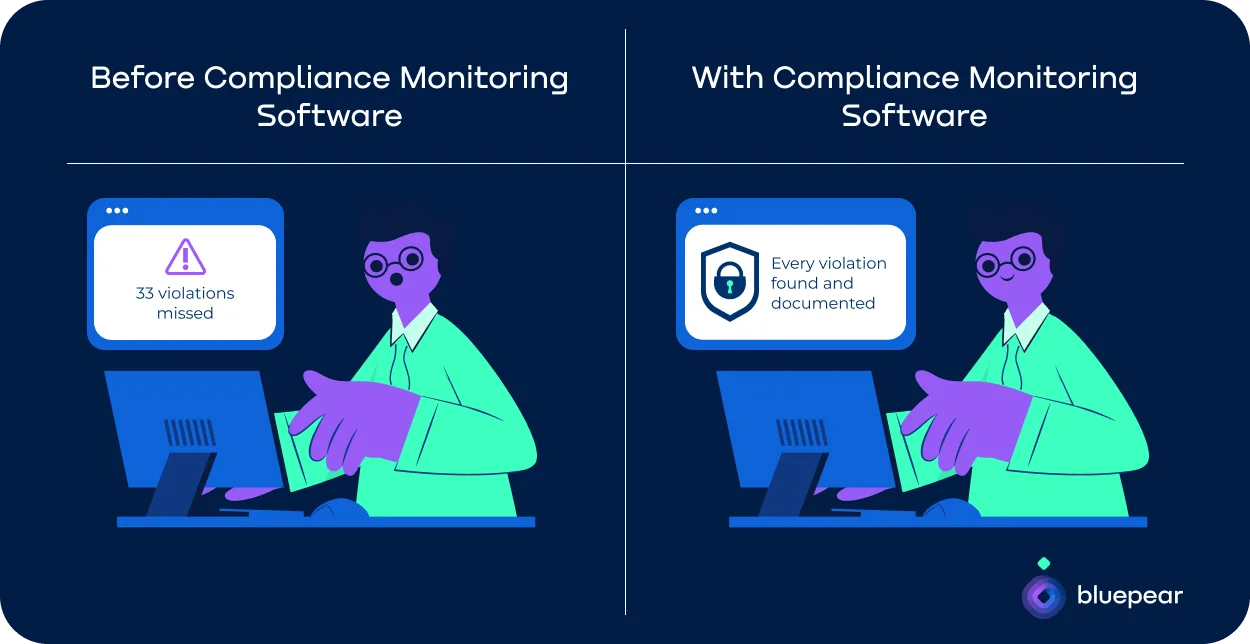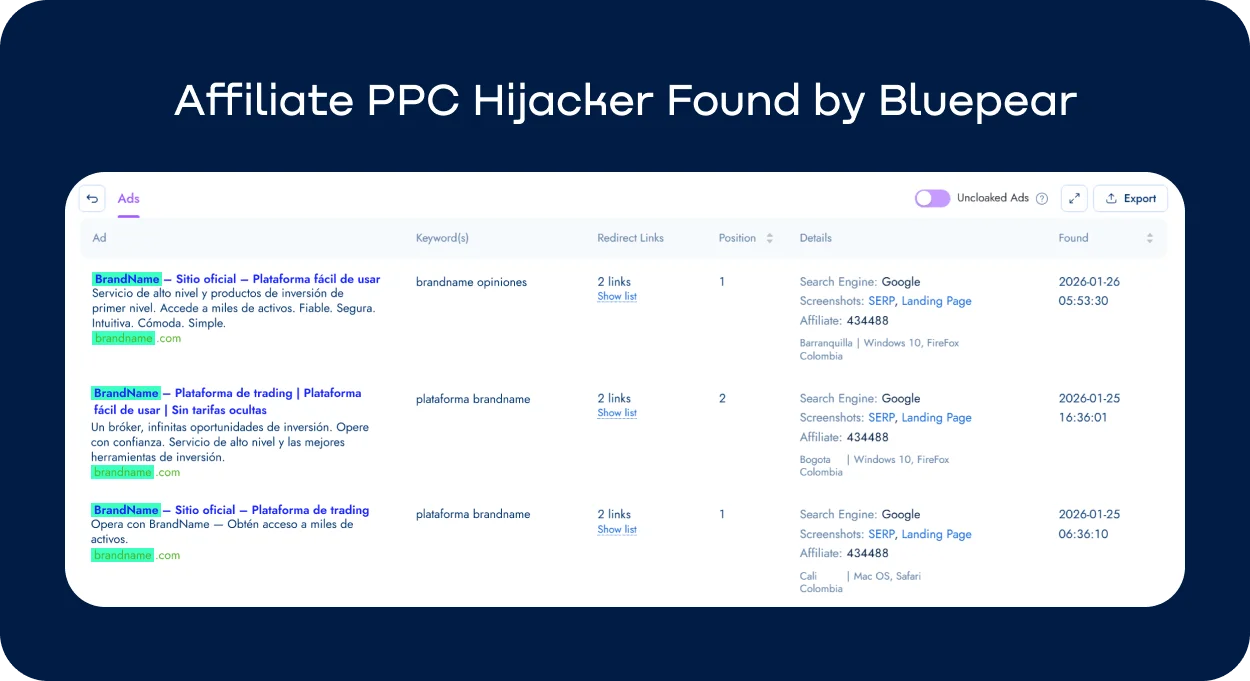
Contents
According to Awin’s Global Affiliate Marketing Report (2024), 1 out of 5 organizations are actively looking for more sophisticated tools to understand what is actually happening inside their affiliate campaigns. In the same report, 66% of respondents named affiliate fraud as their top challenge, while 46% struggled with comprehensive tracking and accurate attribution.
This proves that affiliate rules monitoring is a major growth point for marketing teams today. But how to choose software that will address rule violations and the operational cost of handling them? There are plenty of options, but sometimes it’s really unclear what the difference is beyond price.
This is what this article aims to help you with. It is not a list of software vendors. It’s an overview of the criteria that can help you understand what truly matters when choosing the tools for affiliate tracking.
What Problems Your Affiliate Compliance Software Must Solve
To better understand which affiliate protection tool you need, first you’ve got to understand why you need it and what you’ll achieve by using it.
Affiliate Violations
Affiliate rule violations are easy to miss — especially without dedicated affiliate rules monitoring in place.
The most common violations fall into several recurring patterns:
-
• Brand bidding and PPC compliance — affiliates and competitors bidding on branded keywords, variants, and combinations that cannibalize demand and inflate CPCs.
-
• Trademark misuse — affiliates or fraudsters using protected brand terms in PPC messaging, landing pages, subdomains, or display URLs.
-
• Brand impersonation — websites or ads falsely presenting themselves as “official”. Some fraudulent actors are willing to go far to trick unsuspecting users: in 2024 ThreatLabz analyzed 10,000 malicious lookalike domains and found that 48.4% of them used TLS certificates to appear legitimate.
-
• Unauthorized coupons and misleading promotions — affiliates promoting expired, fake, or non-approved discount codes.
-
• Repeated affiliate fraud and rule violations — violations that are not isolated incidents but part of a pattern. Without historical tracking and enforcement logic, the same affiliates can break rules repeatedly with minimal consequences.
Across all these scenarios, the core challenge is the same: brands cannot reliably monitor affiliate rules at scale without automated detection and structured evidence.
Team’s Efficiency

Manual monitoring and enforcement create their own set of problems. Affiliate managers and marketing teams spend a lot of time on repetitive tasks: checking SERPs, reviewing landing pages, validating coupon usage, and documenting violations. That way, affiliate compliance remains heavily dependent on individual vigilance rather than a reliable system. This approach slows down response times and shifts focus away from strategic decisions that lead to brand growth.
Affiliate compliance software changes this dynamic by automating monitoring. Teams gain speed and consistency, while rule violations are detected continuously, and evidence is collected automatically.
The effects of automation are:
- • faster detection
- • fewer false assumptions based on incomplete data
- • reduced manual workload
- • clearer prioritization of enforcement actions
Affiliate Rules Monitoring vs Agreement Monitoring: Difference and Importance
In vendor messaging, it’s common to see these terms presented as interchangeable. But understanding the difference is essential when choosing compliance software.
Affiliate rules monitoring focuses on observable affiliate behavior. This means the rules that define how affiliates are allowed to operate in real marketing environments. It covers things like brand bidding, trademark usage in ad copy, coupons, false promotional claims, etc. These common patterns can be detected and verified automatically.
However, affiliate rules monitoring does not interpret legal text. It cannot “read” contracts or decide whether a clause was breached in a legal sense.
Affiliate agreement monitoring deals with contractual obligations — contracts and documents that define legal obligations and nuances.
Affiliate agreements define:
-
• legal responsibilities and liabilities
-
• commission eligibility and reversals
-
• termination rights
-
• dispute resolution terms
Most of this content cannot be monitored automatically. Contracts are not observable environments — they are reference documents.
In practice, monitoring affiliate agreements usually means:
-
• maintaining up-to-date contract versions
-
• mapping detected affiliate violations to specific clauses
-
• supporting enforcement, disputes, or removals
This layer becomes relevant after a violation has been identified — not before.
In short, affiliate rules monitoring provides the evidence, while agreement monitoring provides the context.
Key Criteria for Choosing Affiliate Compliance Software
Price is usually the first comparison point — and the least useful one. Affiliate compliance software may look similar on the surface, but is it really? And what differences are actually important? Below we answer those questions by listing the criteria that can actually help you determine which affiliate monitoring tool is best for your brand.
Agency vs SaaS
The affiliate compliance market is mostly split between agency-led services and SaaS platforms. There’s a significant difference between those two models.
Agency-led compliance services work well for brands that prefer outsourced monitoring and enforcement. They usually offer a full-service: the agency monitors, validates, and enforces rules for you. It reduces internal workload for your team, but leads to less control over day-to-day operations and decision-making. In practice, you may never know how exactly the agency tracks affiliate violations, what blind spots there are, and if the reports you receive reflect the full state of things. Agencies are typically more expensive than SaaS options, but provide seasoned specialists’ insights for brands that lack internal expertise.
SaaS platforms suit brands or program managers who want full control, transparency, and flexibility, especially if they have an internal team ready to act on alerts. They cost less than an agency and give full visibility into rule violations, evidence, and historical logs. If your team already has someone responsible for managing affiliates, monitoring software replaces manual audits, lowering the workload.
Agency vs SaaS Comparison Table:
| Aspect | Agency | SaaS Platform |
|---|---|---|
| Control | Limited; agency makes day-to-day decisions | Full; team configures rules, coverage, and alerts |
| Response Time | Depends on agency workflow | Real-time or near real-time alerts |
| Expertise | High; agency team has experience detecting affiliate violations | Depends on internal team; software may provide AI assistance |
| Workload for Your Team | Low; agency handles monitoring and enforcement | Higher; team reviews alerts and takes action |
| Flexibility | Moderate; limited customization of rules and coverage | High; rules, signals, and alert priorities fully configurable |
| Cost | Often higher; recurring agency fees | Typically lower; licensing/subscription fees, though advanced features may cost more |
| Integration | Minimal; agency reports may not integrate with your workflows | Easy; alerts and evidence integrate with dashboards, Slack, or internal tools |
| Visibility & Transparency | Limited; agency provides summaries, not full data | Full; all rule violations, evidence, and historical logs accessible in real time |
Coverage and Detection Logic
Not all affiliate compliance software covers the same scope. Coverage varies significantly depending on data sources, detection methods, and crawl depth.
At a minimum, effective affiliate rules monitoring should cover:
-
• PPC & brand bidding detection
-
• Trademark violations in PPC
-
• Misspellings and brand variations
-
• Content and coupon compliance
Most platforms monitor affiliate compliance by checking whether certain keywords appear in ads or landing pages. For example, they may flag any ad containing your brand name or a prohibited term. It’s a simple and scalable approach, though it requires a well-thought-out brand keyword list to work well.
The most effective platforms combine multiple signals: keywords, SERP snapshots, landing page analysis, and behavioral monitoring. This multi-layered approach catches both obvious and hidden affiliate violations, including:
-
• Cloaked content: affiliates showing compliant content to crawlers but non-compliant content to users
-
• Geo-targeted or time-tied violations: non-compliant ads showing up in specific regions or time frames
-
• Deceptive redirects: traffic being routed through intermediate pages to mask prohibited behavior
When choosing a tool for brand monitoring, read what the website says about the types of threats it can detect, and what methods are used for it.

Signals and Evidence
For affiliate compliance to work, rule violations must be provable. Reliable evidence also enables brands to distinguish isolated mistakes from systematic abuse.
Strong affiliate compliance software provides structured evidence:
- • screenshots with timestamps
- • links
- • redirect chains
- • historical logs showing repeated behavior
Exportable reports also matter because enforcement decisions often involve legal, finance, or partner teams.
These parameters can be evaluated during a free trial period that most affiliate rules monitoring tools have.
Rules Enforcement Capabilities
Monitoring tools only cover detection. Enforcement is a nuanced process that requires human touch as it may involve getting legal advice and exchanging messages with several people.
However, there are some useful features that can make enforcement easier and faster:
-
• real-time alerts for critical violations
-
• escalation letter drafts
-
• documentation for disputes
If your affiliate monitoring software can reduce reaction time and standardize responses — it’s a major advantage.
AI and Analysis Capabilities
Recent industry data from impact.com shows that 32% of brands use AI for partner performance analysis and feedback, while 35% of publishers use AI to automate affiliate-related tasks. This reflects a broader shift toward scalable, intelligent monitoring.
AI can analyze patterns, strengthening the monitoring capabilities and excluding false signals.
Platforms like Bluepear apply AI-driven detection to analyze SERPs, ads, and affiliate fraud behavior patterns continuously — reducing manual checks while improving accuracy. Alerts can be delivered automatically to the channels teams already use — like Slack — reducing response time. Use the free trial to assess every aspect for yourself — simply create an account and start testing.

How to Implement Affiliate Monitoring Software
According to Awin’s Global Affiliate Marketing Report (2024), 44% of marketers name improving the integration of data across digital marketing channels among their top objectives today.
Well-implemented affiliate rules monitoring reduces noise, speeds up response times, and creates shared visibility across teams. Poorly implemented tools, on the other hand, quickly get ignored.
Below is a practical, step-by-step approach that works for most affiliate programs — regardless of size.
1. Audit Your Affiliate Rules
Before turning on any software, review your existing affiliate rules and compliance policies. That will help you analyze reports and make decisions faster.
What you need to mark down:
-
• restrictions on brand bidding and PPC compliance
-
• rules around trademark usage and brand impersonation
-
• coupon and promotional limitations
-
• geographic or channel-specific restrictions
2. Configure Monitoring Scope
In this step you need to set up your priorities and main parameters such as:
-
• Which search engines and regions to track
-
• What brand terms, misspellings, and variations to use
-
• How frequent the scans need to be
-
• What are the priority rules for alerts
Broad coverage increases visibility, but focused configuration improves relevance and actionability.
If you are unsure what parameters you need, check this table for recommendations:
| Configuration Area | Recommended Baseline | Explanation |
|---|---|---|
| Search engines | Google as default; Bing and regional engines (e.g., Baidu, Yandex) where relevant | Google is a must-have for most brands as it holds over 89% of global market share (Statcounter Global Stats). Bing is gaining popularity because it is widely believed that ChatGPT uses data from Bing rather than Google. Regional engines are highly recommended for brands running sales in the associated countries. |
| Regions | All countries where demand or affiliates exist | Affiliate fraud often happens in secondary markets as they receive less attention during manual checks. It’s best to track as many regions as possible, so long as they are relevant for your brand. |
| Brand terms | Official brand name, brand + product/category combinations | Core branded queries are the most common targets for brand bidding and trademark misuse. If you need a keyword list that can help you find up to 100% of affiliate violations, read our guide on keyword research. |
| Misspellings & variations | Common typos, abbreviations, alternative spellings | Misspellings are frequently used by fraudulent actors to bypass affiliate rules and ad platform policies. |
| Scan frequency | Once in 2 hours | Non-stop or very frequent scans sound good on paper, but significantly increase affiliate rules monitoring costs and are unnecessary for most brands as violations do not typically appear every minute. |
| Priority alert rules | Trademark abuse; brand keyword usage in PPC messaging | Priorities for alerts heavily depend on the program terms and monitoring goals. Most brands forbid running branded ads in their referral programs, and trademark violations often require legal action and documented evidence. |
3. Test
Before rolling out enforcement, validate outputs.
Test whether:
-
• alerts trigger when affiliate fraud occurs
-
• screenshots, timestamps, and SERP positions are captured correctly
-
• historical logs are transparent and easy to use
-
• evidence can be exported and shared
This testing phase ensures that when a real issue appears, the data supports confident decision-making.
4. Align Responsibilities
Even the most advanced software will not improve compliance if no one is actively reviewing alerts, validating evidence, and making enforcement decisions.
To make sure your team uses the software, define:
-
• who receives alerts and acts on them
-
• which violations require escalation
-
• how repeated affiliate violations are handled
-
• how disputes are documented
If you are unsure of who should be responsible for affiliate monitoring in your team, check the table below — in it, we list who companies usually assign.
| Team Type | Who Can Monitor Compliance |
|---|---|
| Brands monitoring their own affiliate programs | • Affiliate Manager • Marketing Operations • PPC / Paid Search Specialist • Legal / Compliance Stakeholder • Marketing Leadership |
| Affiliate platforms / agencies or networks | • Program Manager • Partner Operations • Support / Account Manager • Data Analyst / Reporting Specialist • Platform Leadership |
Conclusion
The right affiliate compliance software reduces operational overhead by automating what used to be time-consuming and inconsistent work. Instead of reacting weeks or months later, teams gain the ability to act while the impact is still limited.
A well-chosen solution shifts compliance from a constant firefighting exercise to a structured, repeatable system. Clear rules, reliable signals, and automated affiliate rules monitoring allow teams to focus on growth, partner relationships, and performance — without sacrificing brand safety, PPC efficiency, or trademark integrity.
FAQ
Can affiliate compliance software detect hidden or cloaked violations?
Yes — but only if the software goes beyond basic parsing.
Advanced software uses deeper SERP monitoring, behavioral signals, and cloaking detection to uncover violations that affiliates intentionally try to hide. Bluepear is a good example of a tool that has those capabilities, strengthened by AI analysis for better detection.
How often should a brand monitor affiliate rules?
For most brands, scans every 1–2 hours provide a strong balance between coverage and cost.
Affiliate violations rarely appear and disappear within minutes, but less frequent checks often allow issues like brand bidding or trademark misuse to persist for weeks.
Do smaller affiliate programs really need affiliate compliance software?
Yes, both for programs that intend to stay small and for the ones that are steadily growing.
Smaller programs often have fewer internal resources, which makes manual monitoring even less reliable. Compliance software reduces workload, ensures consistent rule enforcement, and helps smaller teams maintain control.
How does Bluepear support affiliate compliance and protect brand safety?
Bluepear automates affiliate rules monitoring across search engines and regions, identifying rule violations such as unauthorized brand bidding, PPC policy breaches, trademark misuse, and misleading promotions.
The platform continuously tracks affiliate activity, captures verifiable evidence, and centralizes all findings in clear, actionable reports. This allows teams to enforce rules consistently, resolve disputes faster, and maintain brand safety — without relying on manual audits or fragmented tools.

